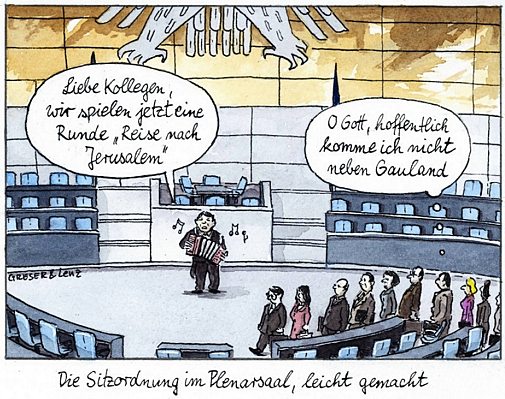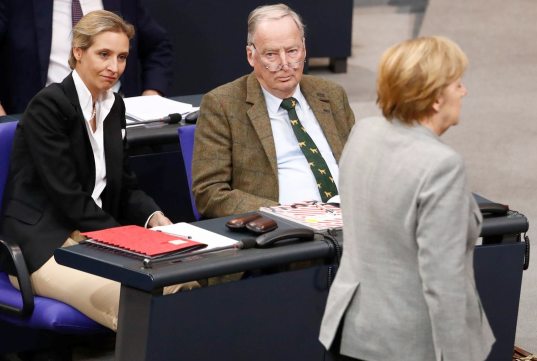Caption: Seating order in the chamber made easy
Singer: Now, dear colleagues, a round of musical chairs.
Thought Balloon: Oh, God, I hope I don’t end up next to Gauland.
This past week marked an historic moment in Germany: representatives of the AfD (Alternative für Deutschland, Alternative for Germany) have taken their seats in the Bundestag for the first time.
Below is an interesting look at the dynamics and strategies of the AfD’s first day in the Bundestag. Many thanks to JLH for translating this article from Die Zeit:
First Session of the Bundestag
It Won’t Be Boring
by Lisa Caspari
October 24, 2017(A turbulent Bundestag: Merkel confronts Gauland, the SPD tries out being the opposition, the AfD shows it is a protest movement. And a Holocaust survivor sits silently on the dais.)
Exactly a month after the Alternative for Germany [AfD, Alternative für Deutschland] turned from candidates into representatives, the caucus met in the plenary chamber for the first time. Seen from the government seats, their seats are at the far right. The 92 representatives stand in front of their blue seats, happily shake hands with each other and take photos. Caucus leader Alice Weidel enters wearing light-colored slacks and a dark blue sport coat, a file folder held lightly under one arm. In the next seat her co-leader, Alexander Gauland, wears his customary beige tweed jacket.
It is quite different from 1983, when the Greens first entered the Bundestag in gym shoes, with flowers in their hair. The AfD, which sees itself as a middle-class party, is not visually striking. The only thing that stands out is the consciously traditional dirndl worn for this special day by a young female AfD representative. Blue, of course — the party color.
Then the chancellor makes her entrance. The cameras whir, Angela Merkel takes the same route as always, through the rear-right entrance, right next to the government seats. This position has long belonged to the Union (CDU-CSU), but is now the place for the AfD.
How Does Merkel Deal With Gauland?
So Merkel, whom AfD supporters call a “traitor to the people” and whose removal the party campaign posters called for, walks by the new representatives. Gauland, whose row of seats is directly opposite Merkel’s government table, stands, and ostentatiously seeks eye contact.[1] Ultimately, the old-new chancellor nods courteously in his direction. It makes no difference.
Later, when the session has begun, Alterspräsident [temporary president by virtue of being the oldest member] Hermann Otto Solms of the FDP will say that he wishes no stigmatizing of the new representatives: “We all have the same mandate, the same rights and the same duties.” Parliament must reflect the diversity of opinion in Germany, and can thus “prove that our democracy is capable of integration.” The AfD claps especially loudly, as does the FDP. Other representatives aren’t sure whether they should join the applause, but do it anyway. Because Solms is right. Still, it seems strange that he was the one who said it.
AfD Criticizes Government’s “Transparent Maneuver”
Because without a short-sighted rule change by the Grand Coalition at the end of the previous legislative period, Solms would not have opened this session. It would have been Wilhelm von Gottberg. At 77, the AfD politician is the oldest representative in the Bundestag, but the government wanted to prevent him from being Alterspräsident. So Solms, as the oldest in service with 33 years in the legislative body, is the first speaker.
The AfD representative Bernd Baumann inveighs against this “transparent maneuver” in his first Bundestag speech. The tradition of the oldest member being the Alterspräsident, he says, has been broken only twice since the German parliament began in 1848. The last time was in 1933 by none other than Nazi Reichstag[2] President Hermann Göring. In his following speech, Marco Buschmann, parliamentary leader of the FDP, calls it “tasteless’ to equate the AfD — of all people — with the victims of the NSDAP.
Meanwhile, on the visitors’ platform, Inge Deutschkron, a Holocaust survivor from Berlin, sits silent. The 95-year-old is wearing a flowered dress, her legs planted firmly on the floor. At least that is how it looks from a distance. The AfD representatives are seated beneath her platform. In a sense, she is hovering over them. What does she — who had warned during the election against the “Sound of the 1920s and 1930s” in Germany — think of such initial verbal skirmishes?
The AfD Remains True to Itself as a Protest Movement
In their first appearance as a parliamentary party, the AfD remains true to itself as a protest movement. At the beginning of the session, their proposal to replace Solms by another group leader is dealt with. A majority of all other parties rejects that. The reaction of the 92 AfD members is to vote unanimously against all proposals of all other parties. And when Alterspräsident Solms thanks former Federal President Norbert Lammert, the new representatives ostentatiously do not applaud.
Not Even for Schäuble is There Applause
Even for Wolfgang Schäuble, elected new president of the Bundestag by 501 of 704 votes, there is at first no applause. Only the leaders, Weidel and Garland rise, go to Schäuble and dutifully shake his hand.
Once in 2016, Schäuble described the AfD as “evil demagogues” appealing to “baser instincts.” On Tuesday, he nonetheless offers his new parliamentary colleagues his hand. If they maintain the basic rules of discussion, he says, the parliament could absolutely be the place where social realities and conflicts were negotiated. Even the AfD applauds Schäuble’s insistence that “tones of disparagement” should have no place in parliament.
As expected, the choice of Albrecht Glaser as candidate for Vice President of the Bundestag is the cause of irritation. In all three votes, the AfD candidate fails [to gain a qualifying number of votes] — probably due to his positions on Islam. Many representatives understood Glaser’s previous statements to mean that he denies Muslims freedom of religion.[3]
The SPD Acts the Hardcore Opposition
While the AfD treats the Bundestag like a strange land, and the other parties do, too, to some extent, the FDP parliamentarians are “old souls” here. They are visibly happy to be back after four years as out-of-parliament opposition. The new Liberal representatives also seem to be in the routine from the start. Wolfgang Kubicki (FDP) chats self-consciously with Claudia Roth (Green), as if there had always been a Jamaica alliance.[4]
On the other hand, the SPD, whose seating has shifted left, acts the part of the two-fisted opposition. Already in his first speech their parliamentary leader, Carsten Schneider, repeats the complaint about the election: Merkel’s refusal of debates had strengthened the AfD.
Frauke Petry is here too — almost unrecognizable. The party-less representative sits far behind her former party friends, in the twelfth row, with the second AfD breakaway, Mario Mieruch and does not participate in any votes. Now and then, she cranes her neck to find out what is happening up front.
The government bench is empty this Tuesday. For the moment, there is just a managerial government. Soon, politicians of the Union, the FDP and the Greens could be taking their seats here. They have already been voting together on individual motions. “There was always change,” says Wolfgang Schäuble, who actually would like to remain as Finance Minister. Now he is enjoying his new task.
The first session shows that it will not be boring for him.
| 1. | The photo at the head of the article makes this a dubious assertion. We see Merkel in the act of walking by Weidel sitting upright, and Gauland slumped comfortably in his seat, staring at his shoes. How fast did he have to leap up and then collapse into his chair for this to be true? Perhaps a little romanticizing to make Merkel seem to be cool and unruffled, and Garland obsequious? | |
| 2. | Imperial assembly. | |
| 3. | In another article, Zeit calls this “an ingenious strategy” to demonstrate that the “old parties” are denying the “mouthpiece of the people” its rights. This is intended to gain the AfD even more followers among both Islam critics and general opponents of the establishment. So the other parties are faced with a dilemma. Should they play Gauland’s game and prove his point (which they do)? And if they don’t, and accept Glaser, they could be accused of elevating an anti-democratic politician to the summit of democracy. | |
| 4. | Using the colors of the Jamaican flag — black-green-yellow — to symbolize a tripartite coalition of a Christian-democratic or conservative party (black), an economically liberal party (yellow) and a green party. |
| Photo: | Bundestag, first session: The long-serving chancellor and the newcomers. Angela Merkel walks by Alexander Gauland and Alice Weidel. |



Hmm … the report above indicates that new times are being ushered into Bundestag. AfD is probably going to represent a fierce opposition to Merkel (and many other parties).
But will it be merely the proverbial “big fish in a small pond”?
Too little and too late. I fear we will be overtaken by facts. I’m a small business owner and circumstances in the company compel me to devote all my attention to it, but if that wouldn’t be the case I’d have posted a plethora of articles re the escalating situation in Belgium, especially over the past few months.
I’m talking about street wars between Turks and Kurds, violent clashes between Moroccans and the police in Anderlecht; a Moroccan city councillor in Molenbeek whose daughter went to join the ranks of ISIS and he is just insisting she did it for love; authochton youngster beaten to a pulp by mobs of young muslims, the revoking of the renovation licence for a mosque in Ostend because they lied about the number of people who would attend, muslim marriage motorcades grandiosely challenging police and paralyzing highways and city centres, and I’m sure I’m forgetting 80 per cent of it.
Things are escalating and it won’t look pretty. For the authochtons I mean. It won’t.
It already doesn’t look pretty for Belgians. Ugly is too mild a word. Depraved and hellish, perhaps?
muslim marriage motorcades , how I hate them every saturday. Then I thought about that noise they cause with some pity : it is a questionable and plebejan sign of joy on the last enjoyable day in their life, having had to marry a first degree cousin they hardly knew and expecting the perpetual supervision of a platoon force of relatives and kids with the usual mortgage of a consanguin marriage. They have no choice of their way of life.This makes them so unpleasant beings.
in 2011 i happend to work for a couple of months in brussels ( i come from SE Europe). I was shocked by the amount of muslims roaming the city, as if they owned the place…i was even more shocked by the attitude of the french speaking colleagues which found this perfectly normal. when i asked one of them : do you feel safe in this city ? he looked at me as if a was crazy…now, fast forward 6 years, i wonder who the crazy one is…